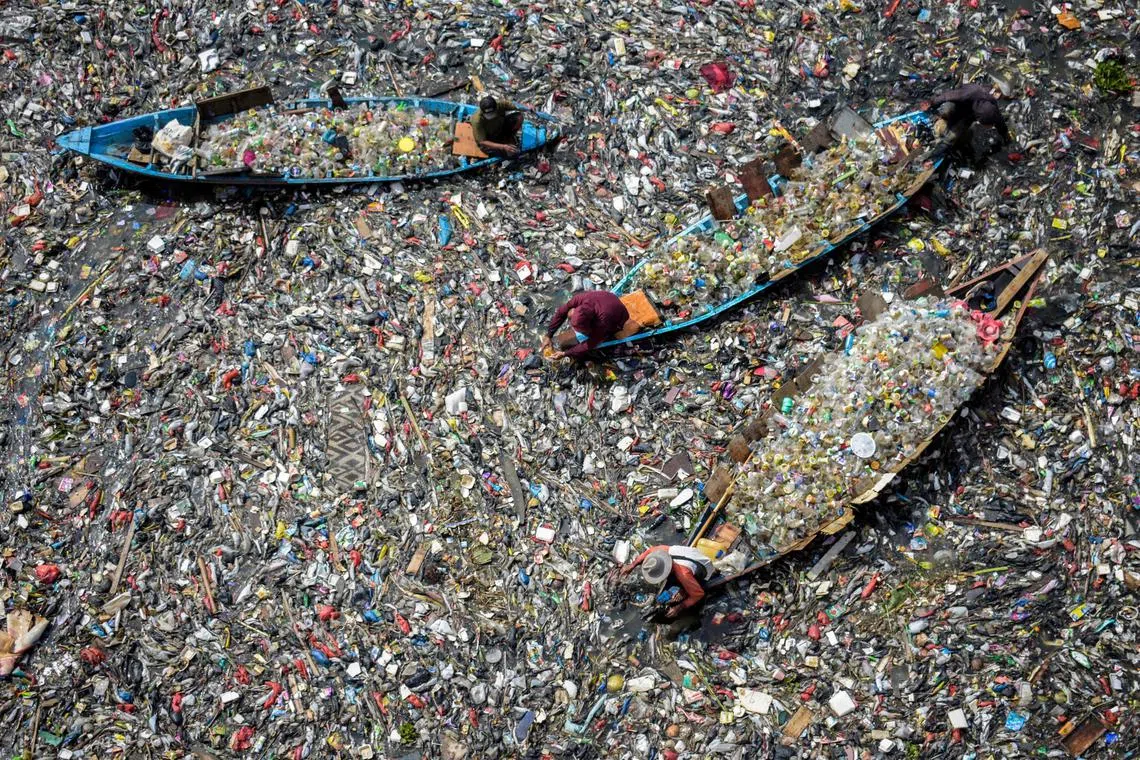ST Explains: Why are the UN plastics treaty talks important?
Sign up now: Get ST's newsletters delivered to your inbox

Plastics take decades to centuries to degrade – the waste pile keeps growing every year.
PHOTO: AFP
SINGAPORE - Delegates from more than 170 nations are meeting in Busan, South Korea, to try to finalise a deal to tackle the global plastics waste crisis.
The UN hopes the talks from Nov 25 to Dec 1 – the fifth round of negotiations since 2022 – will lead to a treaty that will curb the production of plastics and a possible ban on the toxic chemicals used to make plastic products.
At the UN Environment Assembly in Nairobi, Kenya, in March 2022, 175 nations voted to support the creation of a global treaty on plastic pollution and to implement it as soon as 2025.
The UN Environment Programme says the aim is to develop a legally binding instrument on plastic pollution to address the full life cycle of plastic – from production and design, use and disposal to recycling and reuse.
The fifth session of the Intergovernmental Negotiating Committee (INC-5) in Busan is meant to be the final round. Its aim is to finalise and approve the text of the legal instrument.
Why are plastics such a threat?
Plastics take decades to centuries to degrade – the waste pile keeps growing every year.
There are trillions of tiny plastic particles in the air, in the soil and in the oceans, as well as millions of tonnes of large pieces of plastic – from bottles to milk crates to abandoned fishing gear – littering the planet. Animals such as birds, fish, shrimp and whales ingest microplastics, which in turn have been found inside human brains, breast milk and reproductive organs. Microplastics come from synthetic clothing, personal care products and cosmetics, tyre dust and the breaking down of larger pieces of plastic.
There is growing concern about the health risks of microplastics. A recent peer-reviewed study led by Bond University in Australia examined the impact of microplastics and even smaller nanoplastics in the urinary tracts of patients. The researchers found microplastics in 68 per cent of bladder cancer cases and linked them to inflammation and cell damage.
A 2023 UN Environment Programme report pointed out that there are more than 13,000 chemicals associated with plastics and plastic production.
Of these, 3,200 are of potential concern since they are associated with serious illnesses, including diabetes, cardiovascular disease and cancer. The health impact of thousands more chemicals has yet to be studied.
What are the talks’ key issues?
The talks in Busan are focused on key areas, including binding bans and phase-outs of specific plastic products and chemicals of concern to human health; improving product design and reducing waste; finding the money for poorer nations to implement the treaty; and ways to strengthen the treaty over time.
Talks in previous rounds were bogged down because of disputes between rival blocs of nations.
Some countries, particularly the High Ambition Coalition, which groups many African, Asian and European nations, want the treaty to address the life cycle of plastics.
Others, such as big petrochemical manufacturers and fossil fuel producers, like Saudi Arabia and Russia, want to focus more on tackling waste and recycling.
The danger with the latter approach, non-governmental groups say, is that it does not address the growing amounts of plastics produced or the chemicals in them.
Neither does it address the problem of emissions – about 98 per cent of all plastics are made from fossil fuels. Plastic production accounts for about 3 per cent of global greenhouse gas emissions.
Why are the talks important?
It is a race against time. More than 90 per cent of plastics produced are not recycled, and millions of tonnes leach into the environment every year because of poor waste management and illegal dumping.
In an October 2024 report, the Organisation for Economic Cooperation and Development said that without stronger policies, plastics production and use are projected to increase by 70 per cent, from 435 million tonnes in 2020 to 736 million tonnes in 2040, with only 6 per cent of plastics coming from recycled sources.
Mismanaged plastic waste will increase by almost 50 per cent to 119 million tonnes annually in 2040.
What is Singapore’s position in the negotiations?
A Ministry of Sustainability and the Environment spokesman said Singapore has been an active and constructive player in the negotiations to finalise an international legally binding instrument.
“Singapore is of the view it is important to ensure that the instrument is science-based, pragmatic, implementable and facilitates effective actions by all countries to address plastic pollution,” the spokesman said.
“We are committed to participating actively and constructively to help build consensus towards an ambitious, positive and effective outcome at INC-5.”
What is Singapore doing about plastic waste?
In 2023, Singapore’s plastic recycling rate fell to 5 per cent from 6 per cent in 2022, though the amount of plastic waste eased in 2023 to just under one million tonnes.
Household recycling participation has been rising. According to the National Environment Agency’s (NEA) 2023 survey on household recycling, 72 per cent of households recycle, compared with 64 per cent in 2021.
Extended Producer Responsibility (EPR) mandates by governments aim to ensure proper collection and disposal of items after use. Singapore has an EPR for e-waste and is looking to scale this up for packaging materials as well.
Larger producers of packaged products, such as brand owners, manufacturers and importers, as well as retailers like supermarkets, are required to submit packaging data and 3R (reduce, reuse, recycle) plans to the NEA each year.
Packaging waste, including plastics, makes up about one-third of domestic waste disposed of in Singapore. The Government is also funding research to improve plastic recycling and packaging.
Correction note: In an earlier version of this story, we said that starting in 2025, larger producers of packaged products, such as brand owners, manufacturers and importers, as well as retailers like supermarkets, will be required to submit packaging data and 3R (reduce, reuse, recycle) plans to the NEA each year. In fact, the Mandatory Packaging Reporting scheme came into effect in 2021. Eligible companies submitted their first reports on their packaging data and 3R plans for packaging in 2022.



